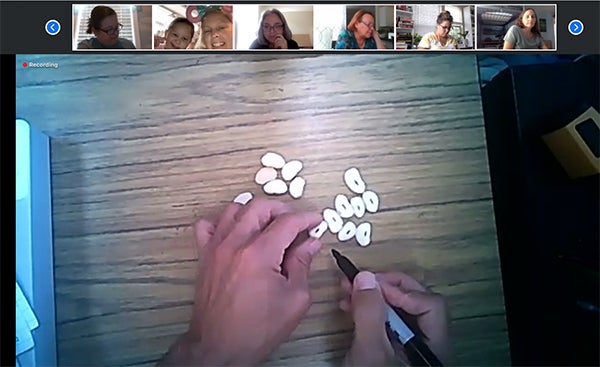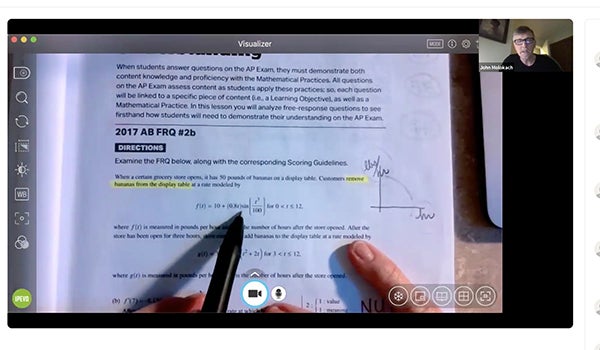AP Summer Institute sees largest participant count in recent years
This year’s Advanced Placement Summer Institute met the challenges of COVID-19 head-on and had one of its largest number of participants in recent years.
The AP Summer Institute (APSI) is a four-day non-residential institute sponsored by the College Board Southern Regional Office and East Carolina University. The institute is designed to benefit beginning AP teachers and current AP teachers wishing to build on an existing course.
“When we dove into the APSI curriculum, there were little hints and tips that I can use to efficiently and effectively make my students even better in the technical writing aspects,” said Michael Larose, an ECU alumnus who took a U.S. history APSI course. “They can certainly write about the basics but to succeed on the AP exam, I need to focus more on the inference and reasoning skills sections. APSI has given me that ability.”

APSI participants were able to watch experiments being conducted virtually by Tom Willis, the biology consultant. (Contributed photos)
On average, about 70-80 teachers participate in ECU’s APSI annually. This year, there were 206 participants who worked with College Board-approved consultants on AP curriculum content and teaching strategies. These consultants were able to use Webex, Canvas and other platforms to meet virtually and teach the courses.
“My consultants rose to the challenge and did a phenomenal job,” said Ann McClung, APSI coordinator at ECU’s Center for STEM Education.
Several ECU faculty and staff members worked collaboratively to ensure that APSI ran smoothly. The College of Education’s Department of Assessment, Data Management, and Digital Learning and ECU’s Information Technology and Computing Services Department with Learning Platforms trained consultants on the learning management system Canvas, since many had never used it before. Both teams were also available during sessions for troubleshooting and connectivity issues.
“It was a great experience. Smooth transition. Great instruction team,” said Susan Citro, a Sampson County teacher and ECU alumna. “The technology was great, and we didn’t have too many interruptions.”
“Overall, I think developing this plan, getting the consultants trained at least a month before the APSI started, and slowly integrating it in really helped,” said McClung. “We unveiled the courses the Wednesday prior to the AP Institute so that people could go in and familiarize themselves with it.”
Teachers were able to learn more than AP course material this summer.
“The opportunity to be a student in this situation will give me insight into how it will be for my students when they are doing the online portion of their classes,” said Ashley Shiosaky, a Greene County teacher and ECU alumna. “Our instructor, Fran Gertz, was amazing and engaged us with synchronous and asynchronous work.”
Transitioning classes to a virtual format was a smoother process than some consultants were expecting and gave them the ability to show how to convert material to a digital format.

AP teachers filmed themselves solving problems to get practice and familiarize themselves with new techniques.
“I have tried to model for APSI participants how to conduct a class online so they could replicate some of the same dynamics in the fall if we end up teaching our students remotely,” said Jose Gregory, an APSI consultant for U.S. history. “Additionally, since it is difficult to be in front of a computer screen for so many hours, I added more breaks and broke things up. Lastly, I also assigned participants to record themselves presenting their favorite lesson using an electronic platform (e.g. Screencast-O-Matic) so they could get practice and become familiar with the format and then do the same to teach their students.”
The AP teachers who participated in this summer’s institute were engaged with the virtual content, according to the consultants who led each session.
“Teachers seemed to appreciate our efforts and were willing to engage with the same activities that they would if we were presenting live,” said Gertz, an AP art and design consultant.
Gregory agreed, adding that although it was harder to get discussions going at times in a virtual meeting, the classes were eager to interact.
“In the case of ECU, I found teachers to be just as warm, receptive and eager to absorb as much as possible via a computer as they have been in person when I was in Greenville,” he said.
For more information, contact McClung at apsi@ecu.edu or 252-328-6885.